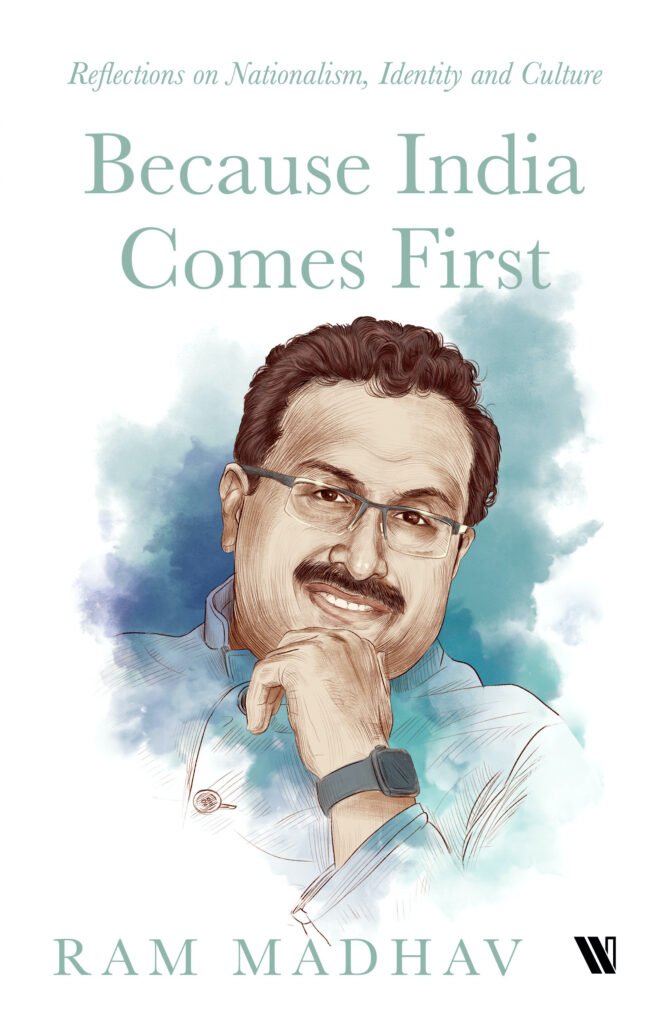|
Listen to article
Getting your Trinity Audio player ready...
|

Because India Comes First is an anthology of an impressive range of essays and articles penned by Ram Madhav over the past decade. He has donned many hats, from being a pracharak of the Rashtriya Swayamsevak Sangh, member of its National Executive, the National General Secretary for the Bharatiya Janata Party (BJP) and eventually the founder of an eminent think tank in New Delhi. Owing to this, he has observed and experienced myriad national developments – ideological, political, and cultural – from a unique vantage point. Consequently, his ideas and writings reflect his distinctive background and a decolonised ideological mooring. Although these ideas have now come to occupy a central stage in Indian polity, they continue to confound, baffle and elude the understandings of many.
Few can articulate these ideas as lucidly, and as incisively as Ram Madhav does. However, the greatest merit of the book lies not in that. While his perspectives remain firmly rooted in indigenous wisdom, he successfully contextualises them among writings and ideas emanating from the leading scholars of the world. This has allowed him to examine the public discourse in India with perspectives from the global debates of our dynamic and interconnected times.
Gandhi had once said, “I do not want my house to be walled in on all sides and my windows to be stuffed. I want the culture of all lands to be blown about my house as freely as possible. But I refuse to be blown off my feet by any”. Ram Madhav truly embodies this spirit. In one telling excerpt, he studies the characters of Sita and Draupadi to highlight the need for feminising the definitions of strength and courage in our contemporary world.
He recognises the resilience of the civilisational values of India, and their relevance today While doing so, he also manages to not sound anachronistic or illiberal. He engages with contrarian ideas and acknowledges shortcomings of our society such as — an egregious lack of strategic culture in India, complexities of the democratic model, lack of constitutional awareness, among others. He approaches them in view of a solution and maintains a steadfast commitment to India’s civilisational value system. There are articles on the legacies of many leaders who have advanced these values through their actions and ideas. The list predictably includes Gandhi, Ambedkar, and Vivekananda, but also Guruji MS Golwalkar, Deendayal Upadhyay, Atal Bihari Vajpayee, and Arun Jaitley whose contributions to Indian politics have been examined in great detail.
The zeitgeist of our times, with the BJP in political power and Prime Minister Modi at the helm, is symbolised by a rise in a national consciousness, cultural rejuvenation, a sense of pride in our glorious legacy and a desire to reclaim India’s influential place in the world. Writing on a spectacular range of ideas, Ram Madhav has thrown light on this social and political evolution in India. He sharply exposes the hypocrisy that has pervaded our public discourse and has prevented the social expression of India’s cultural values. Through his passion for history and a keen eye for detail, he unearthes several crucial incidents from Indian history that have been deliberately buried by Marxist historians. Some of the most pertinent chapters of the book cover the topics of NRC in Assam, CAA for persecuted minorities from the neighbouring Islamic nations, and abrogation of Article 370 where he reveals such historical inconsistencies, while also contextualising the policies among similar exercises from around the world.
He expresses surprise that the opposition would accuse PM Modi and BJP of using ‘nationalism’ for electoral ends, pointing out that nationalism is not just an election issue, but forms the very identity and raison d’être for the BJP. Similarly, his exposition of the contentious idea of Akhand Bharat as a cultural construct as opposed to being a political unit makes for a mandatory read. Few in India can articulate such fundamental motivations that drive PM Modi’s policymaking at large and foreign policy in particular. The essays on India’s dehyphenation policy, a firm stance on Pakistan, the shifting views on China, the decision to move beyond Panchsheel, a strengthened commitment to the Dalai Lama and his followers in exile, are thought-provoking and necessary to understand the context of these policies. The book provides answers to pertinent questions on how India should navigate a new world order, and how it should consolidate its sphere of influence in the neighbourhood and beyond. Ram Madhav’s vision and foresight are apparent in his desire for a new strategic culture for India and in his quest to realise the defining spirit of the nation.
‘Because India Comes First’ is brimming with many such reflections and inferences that make it a must-read for all interested in the 21st-century story of India that is, at once, ancient and new. Ram Madhav’s insightful writings on a wide gamut of themes ranging from Indian philosophy, politics, foreign policy, to loftier questions on culture, identity and society, present an honest appraisal of the opportunities and challenges facing the country in the coming years. Poet A K Ramanujan had once written an interesting essay titled- Is there an Indian way of thinking? If there is indeed an Indian way of thinking, Ram Madhav’s book would come very close to epitomising that.






Super
Excellent analysis, couldn’t agree more. Indeed, Ram Madhav has his own mind deeply rooted in culture and ideology. However, his world-views are more liberal and accommodative compared to that of some die-hard conservatives.
Good initiative,Sir ,This book will help us.
IT cell Assam pradesh BJP
Great Book sir